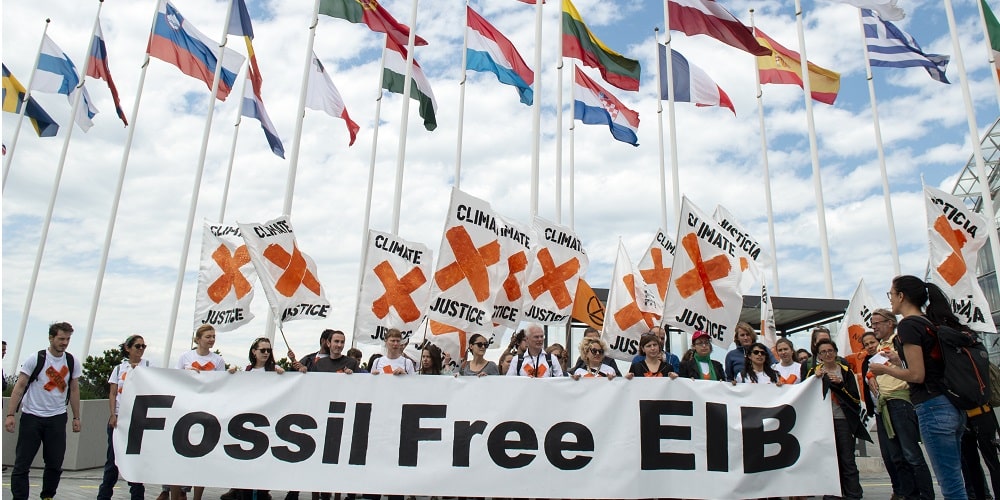World’s largest multilateral bank ends fossil fuels financing
Brussels, Prague — Bankwatch, Counter Balance and a growing number of civil society groups have long been calling on the European Investment Bank (EIB), the EU’s house bank, to recognise the urgency of stemming the climate crisis and stop handing out public money to fossil fuel projects. Today, November 14, the bank’s Board of Directors adopted a new Energy Lending Policy that ends financing for most fossil fuels projects.
14 November 2019

Disruptive action by 350.org at the European Investment Bank demanded end to fossil fuels investments on June 7, 2019
According to a Bankwatch analysis, between 2013 and 2018, the EIB awarded the fossil fuels industry a total of EUR 13.5 billion – or EUR 6.2 million every day over this six year period.
The bank’s fossil fuels financing will end by 2021. From then on, the EIB’s fossil fuels portfolio should be virtually zero.
People around the globe, and particularly young people, have been mobilizing to demand governments take bold climate action. By no longer wasting billions in European public money on fossil fuels, the EIB – owned by the EU’s 28 Member States – is finally acknowledging its responsibility towards future generations.
But if the EIB is to become Europe’s climate bank, as touted by incoming European Commission President Ursula von der Leyen, it needs to swiftly step up its support for energy efficiency and renewable energy projects — not only in the richer Member States, but also in regions like Central and Eastern Europe which have traditionally been dependent on fossil fuels. This can be achieved through the proposed Energy Transition Package. However, this instrument must be reinforced with concrete measures to enable the needed energy transition in those regions.
Today’s landmark decision should also prompt other international financial institutions – multilateral development banks in particular – to immediately halt all support to the fossil fuels industry.
Two years ago, the World Bank pledged to cease funding for upstream oil and gas after 2019, but it is yet to set a deadline for all fossil fuels lending. The European Bank for Reconstruction and Development (EBRD) continues to support the fossil fuels industry. It has invested in equity in Romania-based Black Sea Oil and Gas, in bonds of several fossil fuels companies in Ukraine, Bulgaria, Greece, Turkey, Egypt, as well as in a number of gas grid projects like the Trans Adriatic Pipeline, the Trans Anatolian Pipeline and the BRUA pipeline.
But the sun is setting on fossil fuels subsidies. Both the EBRD and the World Bank should follow in the EIB’s footsteps and divest from fossil fuels.
Xavier Sol, Director of Counter Balance, said:
“This is a great step forward for the EIB – and an achievement for civil society to celebrate. But given the bank’s commitment to align all its operations with the Paris Agreement by the end of 2020, there are serious challenges ahead for the EU’s bank. Firstly, it needs to implement this new energy policy in a stringent manner and not allow fossil gas projects to receive public funding. Then, it needs to update its overarching climate strategy and stop financing carbon-intensive transport modes, as it currently does. Civil society will keep a vigilant eye on these upcoming challenges.”
Anna Roggenbuck, Policy Officer at CEE Bankwatch Network, said:
“This is a historical moment for the European Union. Its financial arm denies further financing for fossil fuels projects as it found them uneconomic and detrimental for the environment. It is laudable that the EIB is the first international development bank to say ‘no’ to fossil fuels. Other international financial institutions should follow suit. Central and Eastern Europe will especially benefit from a dedicated Energy Transition Package. The bank has finally acknowledged it must enhance its support to the deployment of energy efficiency and renewable energy projects.”
For additional information please contact:
Anna Roggenbuck
Policy Officer, CEE Bankwatch Network
annar@bankwatch.org
+48-918315392
+48-509970424
Xavier Sol
Director, Counter Balance
xavier.sol@counter-balance.org
+32(0)2 893 08 61
Never miss an update
We expose the risks of international public finance and bring critical updates from the ground – straight to your inbox.
